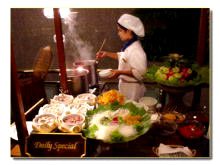Thai Export stocks are winners.
The Weak-Baht's Winners!
Here we are today with a Thai Baht vs.US $ about 15% weaker than where it stood some 6 months ago. Maybe the calm acceptance by the BOT Govorner during these months of gradual Baht weakening contributed to the air of resignation and acceptance, that currently seems to prevail in the market. Definitely a transition in sentiment concerning the Baht has come about. No one is now expecting an imminent rebound. Many are unsure if the sinking has quite stopped. Our own view is that while downside risk remains the worst is probably over.
Certainly the message has finally arrived that the Thai domestic economy is not bouncing back as hoped. Hence, our main message for long was correct in shying away from most all large capitalized shares.
In 1998/9 confidence in recovery had strengthened the currency to the point where many exporters were complaining that margins were falling .Thai's were also buying more imports, finding them more affordable. This brought about a shrinkage in essential FX earnings from the trade surplus. This situation was clearly unsustainable. The BOT has now explained that the export sector has to be enabled so to make a bigger growth contribution in order to add needed support to the weak domestic economy.
|
The weaker Baht immediately increases exporters' revenue and profit and encourages them to increase sales volume and make new investments which further boosts exports and the domestic economy. |
The weak Baht also encourages the substitution of domestic made products in place of increasingly expensive imports. Therefore, there has been an important shift in both the official and the market's attitude towards the Baht's valuation; resulting in a softer currency and prospects for a long-term continuation of Baht weakness as long as the domestic economy struggles against debt and weak demand. The implications for the prospects of exporting companies therefore are very positive and should be studied in detail. And we here plan to do just that.
The extent of the devaluation benefit to any particular exporting company will depend on its performance against the following criteria.
1) The proportion of their sales, directly or indirectly exported.
2) The relative currency strength of their main export markets.
3) The valuation performance of competitive currencies.
4) The extent to which their product contains imported raw material content.
5) The relativity of the size of the devaluation against their usual profit margin.
6) Their ability to increase export sales volume.
7) The absence of any foreign debt (especially US$ or Yen) exposure in their books.
Therefore, for any company a kind of composite picture must be drawn, weighing these 7 factors which can point with different strengths, but hopefully all in the same direction.
Below is an example of a company that showed itself to be a strong beneficiary of devaluation in the recent past and is set to again now rise to a higher profit plateau again.
Chiangmai Frozen Foods (CM, 29.50).
CM does very well on above criteria 1, 2 and 3. They export 95-98% of their frozen vegetables, with about 90% being invoiced in US Dollars to strong-Yen Japan. The Chinese and the Taiwanese are the other competing exporters. The Renminbi has held rock firm against the USD and the Taiwan Dollar has even strengthened a little from last year. While China is still booming with an 8% growth rate, the currency is unlikely to be devalued. Also, awaiting WTO entry, China is not about to pull big surprised -on the currency front. A big positive for CM.
With regards to criteria 4, although CM have some import expenses for seeds and some chemicals, their costs are overwhelmingly paid in Baht. Buying about 25,000mt of vegetables yearly from Thai farmers and processing them to the kitchen-ready stage with about 500 Thai employees accounts for almost all of their expenses before shipment.
Criteria 5 is a bit more testing as CM already enjoys a high net profit margin on sales (NPM ), of about 17.5% in 1999. Their NPM used to be around 13% in 1994 and 1995 when the Baht traded happily at around B25 under BOT control. So it can be seen that last year their NPM was 30% higher than 4 or 5 years ago because CM retained that much advantage from the 50% weaker Baht prevailing in 1999.
With the Baht now 7% weaker than in the comparative quarter of 1999, NPM might expand 4-5% from the first half 2000 average of 16.3% resulting in a 25% profit improvement quarter on quarter. With a similar scale of devaluation already in the works for Q4, they could possibly see their profit margin about 40% higher, by year end.
We are definitely in "intelligent- guesstimate- territory" here and should note that it would be a bit easier for CM to make relatively more profit here if they were not already achieving such an exceptional profit margin.
Criteria 6 provides another way to increase profit, via increased export volume. Between 1998 and 1999 CM's sales value had trended down, due to then Baht strengthening. Sales volume was rather stagnant in first half 2000 and inventories were somewhat high at around 3 months sales. This would have given CM the ability to increase sales volume from stocks in recent months. Also they have short growing cycles for their crops and could increase production in 4-5 months. It is likely that CM has been increasing shipment volume, taking market share from China/Taiwan with more competitive prices.
Finally there are no foreign loan ghosts in the cupboard. CM suffered from that in 1997 but have now paid-off their past USD loans and are now virtually debt free. Their liabilities at about B82m are less than 10% of equity and, with well over B200m in cash deposits; CM could be seen to be more of a lender than a borrower.
This then completes our comparison of CM against the seven criteria. The overall picture is undeniably strong and points to even better times ahead for the company. Now let's look at their market valuation.
Despite CM's relative good performance vs. the SET benchmark since us advocating this firm, (the price held steady and CM paid a total of 7 Baht in dividends over the past 2 years) CM's shares remain outrageously cheap, even before factoring in their rosy prospects.

The company has managed a strong return of 22.8% on shareholders equity over the last 12 months, making B8.17 per share in that period. That equity has a book value of B38.8 per share. However, the depressed market is paying only B29.5 of late, which gives buyers a return of nearly 28% on trailing earnings. When we consider that in a year's time the company may have earned B10-12 per share, the current price or even if one pays a slightly higher price to get some volume, it still represents about 3 times prospective earnings. CM should be snatched up by every value investor. However obviously only a few desperate people are offering to sell at present, so turnover is intermittent. To obtain a significant number of shares a higher price may need and so should be bid.
This would be a good "Buy and Hold" type of investment. Here's another " Buy-Hold reason". CM gave a splendid yield of 10% dividend last year. Their latest B3 per share has every prospect of at least returning next May to the year earlier level of B4 per share or even B5 or more, given their stated policy to distribute 60% of net profit.
Here's a "Hold-reason". The company has innovative management which is seeking diversification into related projects. For example, to replace some of the 5000mt of expensive frozen french-fries imported by the US fast food chains, the company is working to grow a suitable potato variety in Thailand and process locally. They have recently started exporting a frozen fruit desert, with durian as one flavor. Both of these projects could have a healthy future.
The investor might be forgiven for asking why the brokerage house researchers have not reported this bargain. Firstly, because it would be counter productive to brokerage turnover-dependent profitability to promote shares that investors should just "hold". Brokers thrive on short-term traders who are always buying or selling. Unfortunately those high capitalization value stocks that are able to handle large volume are all in the domestic sector and many in the most troubled parts such as banking and finance. The capitalization of the exporters taken together is certainly only a small percentage of the market and their percentage of market turnover is far smaller still. They are no use to the brokers, in fact if their last few years' performance were compared to the most held and traded shares, they would be a potential embarrassment. So they are never reported on, they are totally ignored.

Over the next couple of weeks this column will try to fill the gap by introducing several more of these little known exporters which stand to continue to be outstanding performers in this current situation.
Though small, these companies have invariably achieved standards of international excellence and their exposure to international competition has widened their competence in the commercial environment. They are companies that Thailand can be proud of, the type of company that the country now needs more of now to capitalize on the country's strengths. Therefore, they deserve recognition and encouragement. Their story should and will be told.
Paul A. Renaud & Team.

